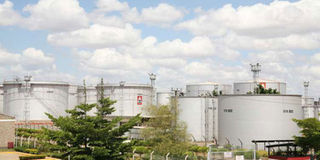Kenya Pipeline school will inject skills in oil and gas sector

Storage tanks at Kenya Pipeline Company's headquarters in Industrial Area, Nairobi. PHOTO | HEZRON NJOROGE | NATION MEDIA GROUP
What you need to know:
Our new school will not only prepare our young people for the future and help reaffirm the country’s status as a leader in oil and gas commerce, but also build human resource capacity in the neighbouring countries to enable them manage, operate and maintain oil and gas pipelines and reduce dependence on expatriate labour.
This is good for the region and Africa in its entirety.
When Kenya Pipeline Company and University of Nairobi recently launched an annual public lecture series in oil and gas to kick off a public discourse on the most prudent ways of utilising the oil and gas resources in the country and the region, I told a packed Taifa Hall audience that Kenya is still importing pipeline welders and coaters from Nigeria, South Africa, Lebanon and China to build for us our pipelines.
Much as this was a shocker for the country, it is a reality that we must face. However, I was delighted when the Cabinet Secretary for Energy and Petroleum Charles Keter in his keynote address admitted that lack of requisite skills for the oil and gas sector remains a major challenge as the country prepares to exploit the newfound resources.
The other challenges the CS cited were lack of adequate oil and gas infrastructure and the high cost of capital required to put up the oil and gas infrastructure, coupled with the huge upfront capital outlay required in the sector.
With these glaring sector gaps, two questions remain critical: how do we prudently utilise the oil and gas resources in our midst? How does Kenya position herself strategically for economic prosperity given the discovery of these opportunities in the region?
These questions may not be answered exhaustively today but to address the skills gaps in the sector, Kenya Pipeline Company has set up the Morendat Centre of Excellence for Oil and Gas Pipelines with the aim of developing human resource capacity for Partner States in Oil and Gas Pipelines Management, Operations and Maintenance to reduce dependence on expatriate human resource.
The Naivasha-based local training school for specialised skills in oil and gas is designed to save on costs incurred in hiring foreign experts to work on the country’s oil and gas infrastructure. It will draw students from eastern Africa, with a view to building local capacity for future oil and gas assignments.
A BRAINCHILD
The setting up of this oil and gas school is a brainchild of the presidents of Kenya, Uganda, Rwanda and South Sudan during the 3rd Heads of States Summit held in Kigali, Rwanda, on October 28, 2013 during which member states agreed that centres of excellence for capacity building be created in order to support the Northern Corridor Integration Projects (NCIP).
Among the centres proposed was KPC’s Morendat Training and Conference Centrer (MTCC). The school was thereafter designated as a Centre of Excellence for Oil and Gas Pipelines during the 7th Summit of the NCIP held in Kampala, Uganda in October 2014.
Being the only such institution in the region and the third in Africa after Sonatrach in Algeria and Transnet in South Africa, Morendat Centre of Excellence will offer competency based technical courses in pipeline maintenance, project management, pipeline technology, operations, safety, quality control and legal and regulatory framework.
The courses to be offered have been reviewed by relevant government agencies such as the Technical, Vocational Education and Training Authority and the Curriculum Development and Assessment Certification Council under the stewardship of the Ministry of Education, Science and Technology.
KPC is the only white (refined) pipeline operator in the region with over 1,300 kilometres of pipeline network. But as the region embarks on large scale oil and gas exploitation, experts estimate that over 2,700 kilometres of pipelines will be developed to coincide with this significant growth.
This will require over 2,500 technicians up from the 700 that the region has all of whom are working in KPC.
As the school opens her doors in September 2016, it will usher in a new dawn for the oil and gas sector. The following six courses will be on offer: Oil Pipeline Technician; Oil Pipeline Mechanical Technician; Oil Pipeline Operations Technician and Oil Pipeline Laboratory Technologist.
The others will be Oil Pipeline Fire Officer and Oil Pipeline Legal Officer. Granted is the fact that the problem of skills gap has been denying Kenya a big portion of mega projects, with most of our young people confined to menial labour.
Our new school will not only prepare our young people for the future and help reaffirm the country’s status as a leader in oil and gas commerce, but also build human resource capacity in the neighbouring countries to enable them manage, operate and maintain oil and gas pipelines and reduce dependence on expatriate labour.
This is good for the region and Africa in its entirety.
Joe Sang is the managing director of Kenya Pipeline Company; [email protected].




